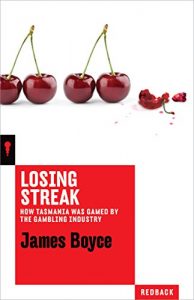A jaw-dropping account of how one company came to own every poker machine in the state of Tasmania – and the cost to democracy, the public purse and problem gamblers and their families.
The story begins with the toppling of a premier, and ends with David Walsh, the man behind MONA, taking an eccentric stand against pokie machines and the political status quo.
It is a story of broken politics and back-room deals. It shows how giving one company the licence to all the poker machines in Tasmania has led to several hundred million dollars of profits (mainly from problem gamblers) being diverted from public use, through a series of questionable and poorly understood deals.
Losing Streak is a meticulous, compelling case study in governance failure, which has implications for pokies reform throughout Australia.
James Boyce is the acclaimed author of Van Diemen’s Land, 1835 and Born Bad. His books have been shortlisted for almost every major Australian literary award and he has won the Tasmania Book Prize on two occasions. He is also a professional social worker, who worked for many years in social policy and research and has been involved in the poker-machine debate for nearly twenty years.
The story begins with the toppling of a premier, and ends with David Walsh, the man behind MONA, taking an eccentric stand against pokie machines and the political status quo.
It is a story of broken politics and back-room deals. It shows how giving one company the licence to all the poker machines in Tasmania has led to several hundred million dollars of profits (mainly from problem gamblers) being diverted from public use, through a series of questionable and poorly understood deals.
Losing Streak is a meticulous, compelling case study in governance failure, which has implications for pokies reform throughout Australia.
James Boyce is the acclaimed author of Van Diemen’s Land, 1835 and Born Bad. His books have been shortlisted for almost every major Australian literary award and he has won the Tasmania Book Prize on two occasions. He is also a professional social worker, who worked for many years in social policy and research and has been involved in the poker-machine debate for nearly twenty years.






